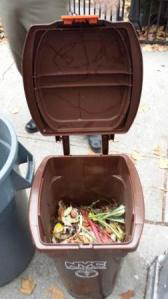My Very Own Brown Bin
By Sophia Kelley
I was elated to see a flyer in my mailbox from the NYC Department of Sanitation this week. Why? Because it said that my building would be one of the 35,000 new households to be part of the city’s expanded organics collection pilot program. In other words, we’re getting our very own brown bin! Perfect timing because our CSA (Community Supported Agriculture) just started summer distributions and the amount of food scraps produced in our kitchen has already increased.
All the buildings in my neighborhood received the bins for food and yard waste and each individual apartment was given a small container for collecting kitchen scraps. The brown bins go to the curb once a week with our regular recycling pick up. Until now, we had to collect our food waste and take it to a community garden or farmer’s market for composting, but now it’s easier than ever to recycle our organic waste.
This is great news because food makes up the largest percentage of waste going to landfills each year and uneaten food rotting in landfills accounts for almost 25 percent of U.S. methane emissions, a potent greenhouse gas. So think about climate change the next time you toss your leftover lunch into the trash.
Instead of landfills, our organic waste is going to be turned into compost to help keep the soil in New York City’s parks healthy. Some of the scraps are also going to be collected and taken to the Newtown Creek sewage treatment plant. The waste will be put to use in an anaerobic digestion process that will capture the methane and convert it to biogas which can then be used to generate electricity… all from your old pizza crusts!
If your neighborhood has not been included yet in the organics recycling program, don’t worry – the city’s goal is to provide all New Yorkers access to organics recycling by 2018. Until then, do your best to prevent food waste and take your kitchen scraps to the nearest compost collection project.


